Distinguished Critique: Justice League International: The Secret Gospel of Maxwell Lord Review
A mediocre final third can hardly diminish the other engaging chapters in this volume, blending humor and heroics with well-rounded characters
—by Nathan on June 10, 2025—
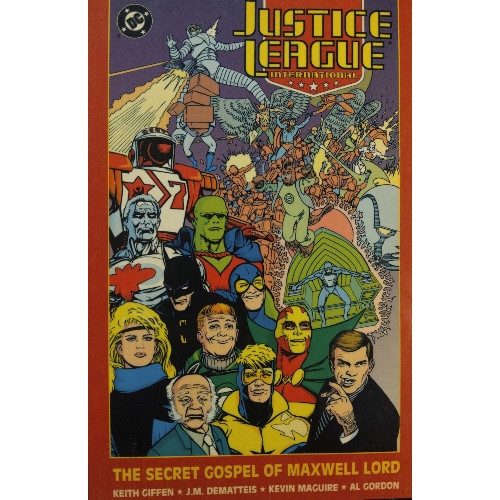
About a year ago, I explored the first seven issues of DC's post-Crisis take on the Justice League, the first group to take on the moniker since the last incarnation ceremoniously disbanded in the wake of Legends. Spearheaded by J.M. DeMatteis, Keith Giffen, and Kevin Maguire, the team represented a brand-new era for the team. Gone were the big guns–Superman, Wonder Woman, the Flash. Sure, Batman was part of the group, and the team had a Green Lantern…ah, hold on, it's only Guy Garnder. Never mind! Point is, second-stringers ruled the day. Blue Beetle, Booster Gold, Mister Miracle…the runners-up and has-beens were the faces of the new League.
The pivot enabled DeMatteis, Giffen, and Maguire to embrace a perfect balance of levity and superheroics, finding humor in the everyday existence of these characters while also having them fight terrorists and malevolent deities. We'll examine how that balance is explored here as the Justice League tacks "International" onto their name and goes global, becoming a team that fights for the world, not just whatever happens on American soil.
Justice League International: The Secret Gospel of Maxwell Lord
Writers: J.M. DeMatteis and Keith Giffen
Pencilers: Bill Willingham and Kevin Maguire
Inkers: Robert Campanella, Dick Giordano, Dennis Janke, Bruce D. Patterson, P. Craig Russell, Bill Wray, and Al Gordon
Colorist: Gene D'Angelo
Letterers: Bob Lappan and John Workman
Issues: Justice League Annual #1, Justice League International #8-12
Publication Dates: September 1987, December 1987-April 1988
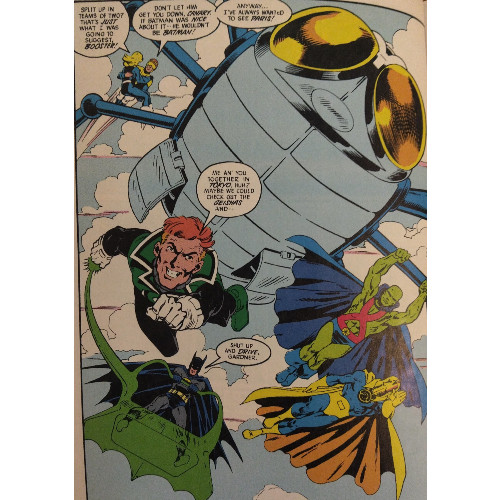
I knew Maxwell Lord was a no-good, low-down scallywag when I started this series. When I first began reading Justice League International, I automatically identified him as the guy who once made Superman go berserk and then got his neck snapped by Wonder Woman. What I didn't know is how he got that way…and I was pleasantly surprised to find that his machinations during Infinite Crisis technically have their seeds sown in these early JLI issues.
Lord is a great example of how fantastically subtle this series is, how DeMatteis and Giffen expertly craft humor and action to both entertain and subvert expectations. While you laugh at an ongoing joke involving the abysmally rude Guy Gardner behaving decently to everyone after a bump on his noggin or smirk at Rocket Red teasing Black Canary by spouting American witticisms, our writers weave a shadowy tendril in the background, elements of a larger narrative which go unrevealed for a while. You may not be caught completely be surprise, but you may find the twists and turns taken engaging.
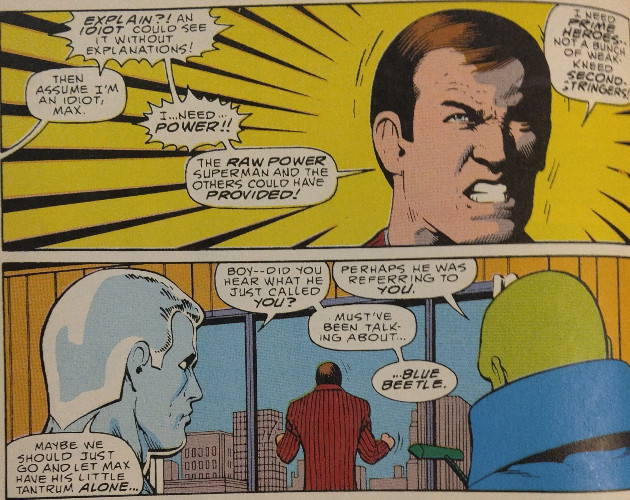
Lord isn't a member of the team (though he'd later get superpowers of his own), but his insistence on bankrolling and supporting the JLI should raise eyebrows from the beginning. He's not a supervillain, not in the traditional sense, but he has plans up his suit jacket sleeves that should make you wary. His charisma is effortless, his demeanor downright likable…all of this is used to charm not just our heroes (or, at least, most of our heroes…that Batman's always a little suspicious, like he's a detective or something) but the reader as well. Lord's meant to be a bit of a puzzler, a head-scratcher. You should be equally invested in the kind of character he is as you are the actions propelling our heroes, wondering just what little twist Lord will add to the game he's methodically playing.
Sure, other, more obvious villains make themselves known, whether they're Russian politicians, a mind-controlling spore which parasitically controls people, or agents of the race known as the Manunters (no relation to the jade J'onn J'onzz). We've got our bad guys to bop in the face and haul off to prison. But DeMatteis and Giffen seem less interested in using your garden variety supervillain to generate physical confrontations as they are in developing different kinds of conflict. Lord's duplicity is intended to call into question the team's purpose, the Manhunters sew deceit to divide heroes, and the crooked politicians play into the struggles the Justice League encounter operating on a global scale. This is the "Justice League International," after all; if they want to play on a larger stage, DeMatteis and Giffen seem determined to embroil them in geopolitics and indicate how real world threats and corruption can stymie even the most stalwart of heroic intentions.
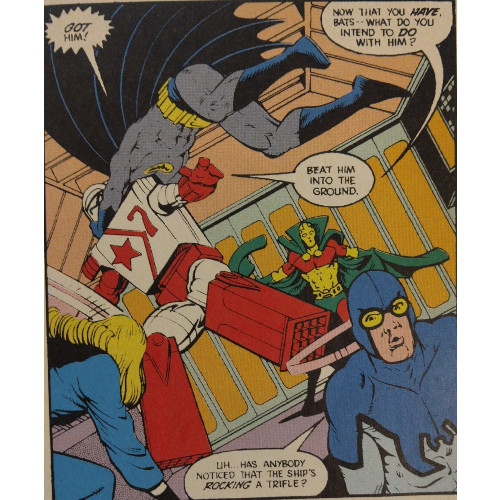
In JLI, as in any team book, one of the main draws is the make-up of the team and the potential for relationships to be forged between characters as the whole group is drawn together. The standout friendship DeMatteis, Giffen, and Maguire craft is between Blue Beetle and Booster Gold. Both are young, somewhat immature man-boys, liable to get in trouble out of costume almost as much as they do in their heroic identities. Beetle's penchant for finding hilarity in Booster's slip-ups, especially with women, feels very real. Think of your best friend and the hijinks you get up to, or even better, the hijinks you put each other up to. That's the crux of the Blue/Gold relationship at this time, and it's done to great effect. The humor is balanced by the more serious demeanors of Batman and Martian Manhunter, arguably the most senior heroes among the group, who attempt to wrangle these youngbloods together. I don't know if, by 1987, fans were convinced characters such as Guy Gardner, Blue Beetle (a relatively recent acquisition from Charlton Comics, alongside the Question and fellow JLI-er Captain Atom), or Booster Gold were hero material like Superman, Batman, and the like…or even if they were strong characters. DeMatteis, Giffen, and Maguire position themselves to showcase those characters' strengths as heroes and people here, prepping them for the big leagues. These are the next generation of heroes, and even if they lack the reliability of their predecessors, we're supposed to watch them grow, through triumph and trial.
As well as the the team dynamic is sewn throughout the volume, the creators also capably weave in great character moments and qualities. Black Canary and Rocket Red develop an unlikely friendship across smaller beats in different issues. In the team's first annual, Martian Manhunter rescues the rest of the League, his love for his friends showing his humanity, even if he is from another planet. Guy Gardner, the effects of his bump still intact, behaves like an actual hero and a gentleman to Black Canary, a humorous inversion of his general abrasive self–there's an indication the bump has revealed a more genuine side of Guy he actively chooses to cover up with his abrasiveness, for whatever reason. Powers are shown in fun ways as well, whether it's master escape Mister Miracle deftly rescuing himself from a fall or Booster Gold saving the team from a Manhunter agent. It seems everyone is allowed an opportunity to distinguish themselves and establish their individual identities to avoid the group from feeling like a jumble of poorly defined super-people.
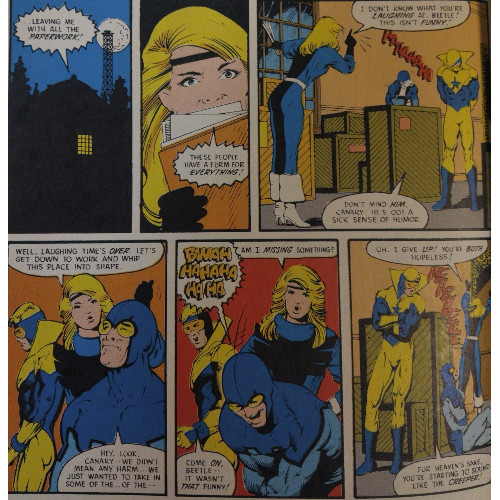
I've referenced the Manhunters a few times, and I'll admit to being ever so slightly worried when I realized a few issues in this volume touched on DC's Millennium event, which saw the Manhunters replace people throughout the DC Universe, such as James Gordon and Wally West's father. I felt "bleh" about the event and "meh" about the tie-ins so far, and I am of two minds with the JLI tie-in issues. DeMatteis and Giffen achieve a subversive poke at the event in the first tie-in issue, with a JLI member revealing their duplicity off the cuff and the fight to subdue them, though with serious stakes, portrayed in a humorous fashion. It's a genuinely amusing issue, not taking the "Aw, no, that guy's a Manhunter!" piece too seriously, even making a joke off the villains' oft-repeated "No man can escape the Manhunters!" catchphrase. The second issue seeks to further the event's actual plot, and though it has its witty moments, it ends up using several non-JLI members to tell this portion of the story. The issue feels told out of necessity instead of desire–DeMatteis, Giffen, and Maguire apply their trademark verbal and visual humor to the proceedings, but it feels less a JLI issue and more a needed chapter in a longer narrative, a detour that's just a little bumpy.
Elsewhere, the crew don't land the plane as smoothly as they could, the concluding issues feeling somewhat rough in execution. A major plot point is wrapped up, largely through the use of long-winded exposition and flashbacks, while adding a wrinkle or two which somewhat bamboozled me. Perhaps a re-read is in order for me to grasp everything completely, but I felt that injecting a strange new development–introducing a new adversary and a possible villain–took away from the larger narrative, lengthening the exposition needed to explain where all the pieces fell. Part of me wishes the aforementioned development was excised in favor of strengthening the central plot, which I enjoyed and wished was given more tension rather than a surge of rambling to explain the whole thing.
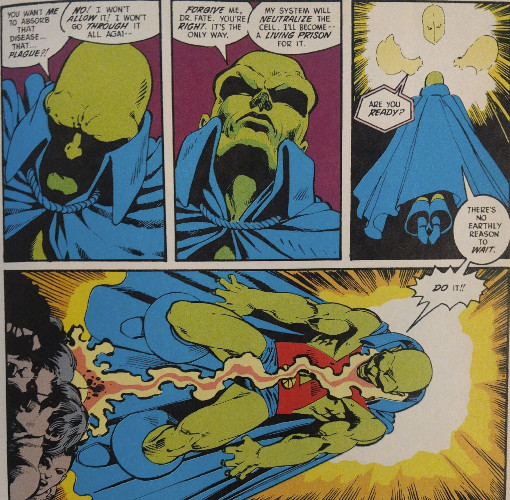
Aside from a bumpy final arc, this volume valiantly continues the same tone from the first JLI collection I reviewed. The same humor, wit, and heart is presented here, fully intact. The team develops as a unit, and characters are allowed moments to present themselves as heroes and humans alike. When they're not fighting the Manhunters, the JLI is moving into their worldwide embassies, setting up electronics and carrying boxes. The series feels akin to Chris Claremont, Dave Cockrum, and John Byrne's Uncanny X-Men, which expertly blended superheroic action with very human characters who found time to play baseball and go swimming. The effort here isn't perfect–the last third or so the volume isn't as strong as the rest of the material–but it's still a very fun read from clever creators developing what many readers believe is the finest (and certainly the funniest) era of Justice League comics.